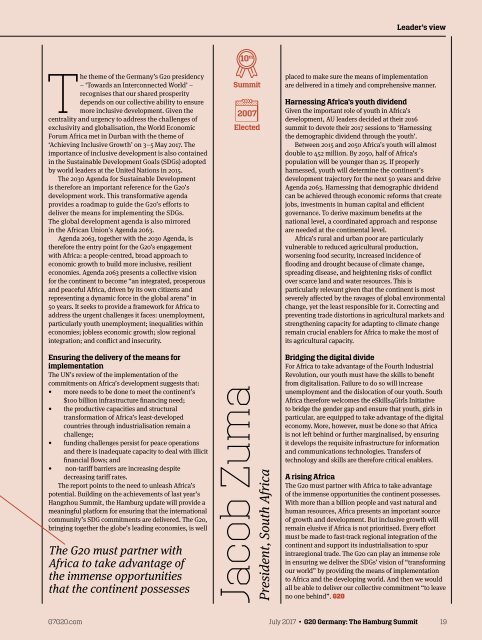G20-Germany-Hamburg-2017
mo.rami@trmg.co.uk
mo.rami@trmg.co.uk
Create successful ePaper yourself
Turn your PDF publications into a flip-book with our unique Google optimized e-Paper software.
10 th Leader’s view<br />
The theme of the <strong>Germany</strong>’s <strong>G20</strong> presidency<br />
– ‘Towards an Interconnected World’ –<br />
recognises that our shared prosperity<br />
depends on our collective ability to ensure<br />
more inclusive development. Given the<br />
centrality and urgency to address the challenges of<br />
exclusivity and globalisation, the World Economic<br />
Forum Africa met in Durban with the theme of<br />
‘Achieving Inclusive Growth’ on 3–5 May <strong>2017</strong>. The<br />
importance of inclusive development is also contained<br />
in the Sustainable Development Goals (SDGs) adopted<br />
by world leaders at the United Nations in 2015.<br />
The 2030 Agenda for Sustainable Development<br />
is therefore an important reference for the <strong>G20</strong>’s<br />
development work. This transformative agenda<br />
provides a roadmap to guide the <strong>G20</strong>’s efforts to<br />
deliver the means for implementing the SDGs.<br />
The global development agenda is also mirrored<br />
in the African Union’s Agenda 2063.<br />
Agenda 2063, together with the 2030 Agenda, is<br />
therefore the entry point for the <strong>G20</strong>’s engagement<br />
with Africa: a people-centred, broad approach to<br />
economic growth to build more inclusive, resilient<br />
economies. Agenda 2063 presents a collective vision<br />
for the continent to become “an integrated, prosperous<br />
and peaceful Africa, driven by its own citizens and<br />
representing a dynamic force in the global arena” in<br />
50 years. It seeks to provide a framework for Africa to<br />
address the urgent challenges it faces: unemployment,<br />
particularly youth unemployment; inequalities within<br />
economies; jobless economic growth; slow regional<br />
integration; and conflict and insecurity.<br />
Ensuring the delivery of the means for<br />
implementation<br />
The UN’s review of the implementation of the<br />
commitments on Africa’s development suggests that:<br />
• more needs to be done to meet the continent’s<br />
$100 billion infrastructure financing need;<br />
• the productive capacities and structural<br />
transformation of Africa’s least-developed<br />
countries through industrialisation remain a<br />
challenge;<br />
• funding challenges persist for peace operations<br />
and there is inadequate capacity to deal with illicit<br />
financial flows; and<br />
• non-tariff barriers are increasing despite<br />
decreasing tariff rates.<br />
The report points to the need to unleash Africa’s<br />
potential. Building on the achievements of last year’s<br />
Hangzhou Summit, the <strong>Hamburg</strong> update will provide a<br />
meaningful platform for ensuring that the international<br />
community’s SDG commitments are delivered. The <strong>G20</strong>,<br />
bringing together the globe’s leading economies, is well<br />
The <strong>G20</strong> must partner with<br />
Africa to take advantage of<br />
the immense opportunities<br />
that the continent possesses<br />
Summit<br />
2007<br />
Elected<br />
Jacob Zuma<br />
President, South Africa<br />
placed to make sure the means of implementation<br />
are delivered in a timely and comprehensive manner.<br />
Harnessing Africa’s youth dividend<br />
Given the important role of youth in Africa’s<br />
development, AU leaders decided at their 2016<br />
summit to devote their <strong>2017</strong> sessions to ‘Harnessing<br />
the demographic dividend through the youth’.<br />
Between 2015 and 2050 Africa’s youth will almost<br />
double to 452 million. By 2050, half of Africa’s<br />
population will be younger than 25. If properly<br />
harnessed, youth will determine the continent’s<br />
development trajectory for the next 50 years and drive<br />
Agenda 2063. Harnessing that demographic dividend<br />
can be achieved through economic reforms that create<br />
jobs, investments in human capital and efficient<br />
governance. To derive maximum benefits at the<br />
national level, a coordinated approach and response<br />
are needed at the continental level.<br />
Africa’s rural and urban poor are particularly<br />
vulnerable to reduced agricultural production,<br />
worsening food security, increased incidence of<br />
flooding and drought because of climate change,<br />
spreading disease, and heightening risks of conflict<br />
over scarce land and water resources. This is<br />
particularly relevant given that the continent is most<br />
severely affected by the ravages of global environmental<br />
change, yet the least responsible for it. Correcting and<br />
preventing trade distortions in agricultural markets and<br />
strengthening capacity for adapting to climate change<br />
remain crucial enablers for Africa to make the most of<br />
its agricultural capacity.<br />
Bridging the digital divide<br />
For Africa to take advantage of the Fourth Industrial<br />
Revolution, our youth must have the skills to benefit<br />
from digitalisation. Failure to do so will increase<br />
unemployment and the dislocation of our youth. South<br />
Africa therefore welcomes the eSkills4Girls Initiative<br />
to bridge the gender gap and ensure that youth, girls in<br />
particular, are equipped to take advantage of the digital<br />
economy. More, however, must be done so that Africa<br />
is not left behind or further marginalised, by ensuring<br />
it develops the requisite infrastructure for information<br />
and communications technologies. Transfers of<br />
technology and skills are therefore critical enablers.<br />
A rising Africa<br />
The <strong>G20</strong> must partner with Africa to take advantage<br />
of the immense opportunities the continent possesses.<br />
With more than a billion people and vast natural and<br />
human resources, Africa presents an important source<br />
of growth and development. But inclusive growth will<br />
remain elusive if Africa is not prioritised. Every effort<br />
must be made to fast-track regional integration of the<br />
continent and support its industrialisation to spur<br />
intraregional trade. The <strong>G20</strong> can play an immense role<br />
in ensuring we deliver the SDGs’ vision of “transforming<br />
our world” by providing the means of implementation<br />
to Africa and the developing world. And then we would<br />
all be able to deliver our collective commitment “to leave<br />
no one behind”. <strong>G20</strong><br />
G7<strong>G20</strong>.com July <strong>2017</strong> • <strong>G20</strong> <strong>Germany</strong>: The <strong>Hamburg</strong> Summit 19
















